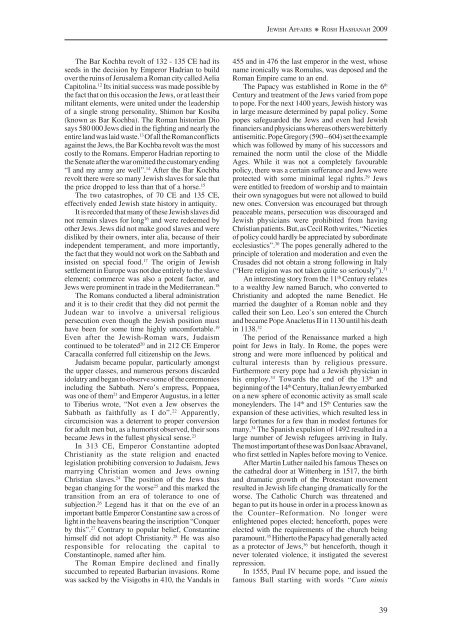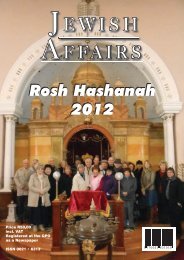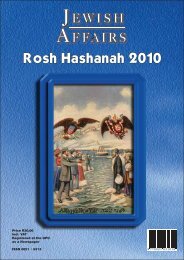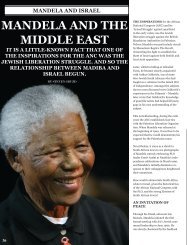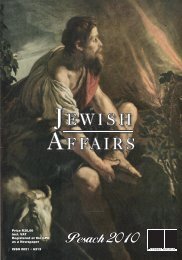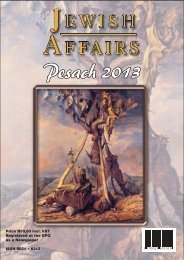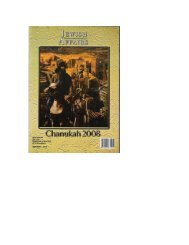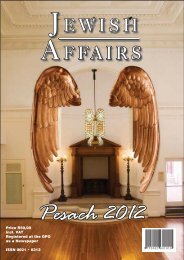Rosh Hashanah 2009 - South African Jewish Board of Deputies
Rosh Hashanah 2009 - South African Jewish Board of Deputies
Rosh Hashanah 2009 - South African Jewish Board of Deputies
- No tags were found...
Create successful ePaper yourself
Turn your PDF publications into a flip-book with our unique Google optimized e-Paper software.
JEWISH AFFAIRS ROSH HASHANAH <strong>2009</strong>The Bar Kochba revolt <strong>of</strong> 132 - 135 CE had itsseeds in the decision by Emperor Hadrian to buildover the ruins <strong>of</strong> Jerusalem a Roman city called AeliaCapitolina. 12 Its initial success was made possible bythe fact that on this occasion the Jews, or at least theirmilitant elements, were united under the leadership<strong>of</strong> a single strong personality, Shimon bar Kosiba(known as Bar Kochba). The Roman historian Diosays 580 000 Jews died in the fighting and nearly theentire land was laid waste. 13 Of all the Roman conflictsagainst the Jews, the Bar Kochba revolt was the mostcostly to the Romans. Emperor Hadrian reporting tothe Senate after the war omitted the customary ending“I and my army are well”. 14 After the Bar Kochbarevolt there were so many <strong>Jewish</strong> slaves for sale thatthe price dropped to less than that <strong>of</strong> a horse. 15The two catastrophes, <strong>of</strong> 70 CE and 135 CE,effectively ended <strong>Jewish</strong> state history in antiquity.It is recorded that many <strong>of</strong> these <strong>Jewish</strong> slaves didnot remain slaves for long 16 and were redeemed byother Jews. Jews did not make good slaves and weredisliked by their owners, inter alia, because <strong>of</strong> theirindependent temperament, and more importantly,the fact that they would not work on the Sabbath andinsisted on special food. 17 The origin <strong>of</strong> <strong>Jewish</strong>settlement in Europe was not due entirely to the slaveelement; commerce was also a potent factor, andJews were prominent in trade in the Mediterranean. 18The Romans conducted a liberal administrationand it is to their credit that they did not permit theJudean war to involve a universal religiouspersecution even though the <strong>Jewish</strong> position musthave been for some time highly uncomfortable. 19Even after the <strong>Jewish</strong>-Roman wars, Judaismcontinued to be tolerated 20 and in 212 CE EmperorCaracalla conferred full citizenship on the Jews.Judaism became popular, particularly amongstthe upper classes, and numerous persons discardedidolatry and began to observe some <strong>of</strong> the ceremoniesincluding the Sabbath. Nero’s empress, Poppaea,was one <strong>of</strong> them 21 and Emperor Augustus, in a letterto Tiberius wrote, “Not even a Jew observes theSabbath as faithfully as I do”. 22 Apparently,circumcision was a deterrent to proper conversionfor adult men but, as a humorist observed, their sonsbecame Jews in the fullest physical sense. 23In 313 CE, Emperor Constantine adoptedChristianity as the state religion and enactedlegislation prohibiting conversion to Judaism, Jewsmarrying Christian women and Jews owningChristian slaves. 24 The position <strong>of</strong> the Jews thusbegan changing for the worse 25 and this marked thetransition from an era <strong>of</strong> tolerance to one <strong>of</strong>subjection. 26 Legend has it that on the eve <strong>of</strong> animportant battle Emperor Constantine saw a cross <strong>of</strong>light in the heavens bearing the inscription “Conquerby this”. 27 Contrary to popular belief, Constantinehimself did not adopt Christianity. 28 He was alsoresponsible for relocating the capital toConstantinople, named after him.The Roman Empire declined and finallysuccumbed to repeated Barbarian invasions. Romewas sacked by the Visigoths in 410, the Vandals in455 and in 476 the last emperor in the west, whosename ironically was Romulus, was deposed and theRoman Empire came to an end.The Papacy was established in Rome in the 6 thCentury and treatment <strong>of</strong> the Jews varied from popeto pope. For the next 1400 years, <strong>Jewish</strong> history wasin large measure determined by papal policy. Somepopes safeguarded the Jews and even had <strong>Jewish</strong>financiers and physicians whereas others were bitterlyantisemitic. Pope Gregory (590 – 604) set the examplewhich was followed by many <strong>of</strong> his successors andremained the norm until the close <strong>of</strong> the MiddleAges. While it was not a completely favourablepolicy, there was a certain sufferance and Jews wereprotected with some minimal legal rights. 29 Jewswere entitled to freedom <strong>of</strong> worship and to maintaintheir own synagogues but were not allowed to buildnew ones. Conversion was encouraged but throughpeaceable means, persecution was discouraged and<strong>Jewish</strong> physicians were prohibited from havingChristian patients. But, as Cecil Roth writes, “Niceties<strong>of</strong> policy could hardly be appreciated by subordinateecclesiastics”. 30 The popes generally adhered to theprinciple <strong>of</strong> toleration and moderation and even theCrusades did not obtain a strong following in Italy(“Here religion was not taken quite so seriously”). 31An interesting story from the 11 th Century relatesto a wealthy Jew named Baruch, who converted toChristianity and adopted the name Benedict. Hemarried the daughter <strong>of</strong> a Roman noble and theycalled their son Leo. Leo’s son entered the Churchand became Pope Anacletus II in 1130 until his deathin 1138. 32The period <strong>of</strong> the Renaissance marked a highpoint for Jews in Italy. In Rome, the popes werestrong and were more influenced by political andcultural interests than by religious pressure.Furthermore every pope had a <strong>Jewish</strong> physician inhis employ. 33 Towards the end <strong>of</strong> the 13 th andbeginning <strong>of</strong> the 14 th Century, Italian Jewry embarkedon a new sphere <strong>of</strong> economic activity as small scalemoneylenders. The 14 th and 15 th Centuries saw theexpansion <strong>of</strong> these activities, which resulted less inlarge fortunes for a few than in modest fortunes formany. 34 The Spanish expulsion <strong>of</strong> 1492 resulted in alarge number <strong>of</strong> <strong>Jewish</strong> refugees arriving in Italy.The most important <strong>of</strong> these was Don Isaac Abravanel,who first settled in Naples before moving to Venice.After Martin Luther nailed his famous Theses onthe cathedral door at Wittenberg in 1517, the birthand dramatic growth <strong>of</strong> the Protestant movementresulted in <strong>Jewish</strong> life changing dramatically for theworse. The Catholic Church was threatened andbegan to put its house in order in a process known asthe Counter–Reformation. No longer wereenlightened popes elected; henceforth, popes wereelected with the requirements <strong>of</strong> the church beingparamount. 35 Hitherto the Papacy had generally actedas a protector <strong>of</strong> Jews, 36 but henceforth, though itnever tolerated violence, it instigated the severestrepression.In 1555, Paul IV became pope, and issued thefamous Bull starting with words “Cum nimis39


